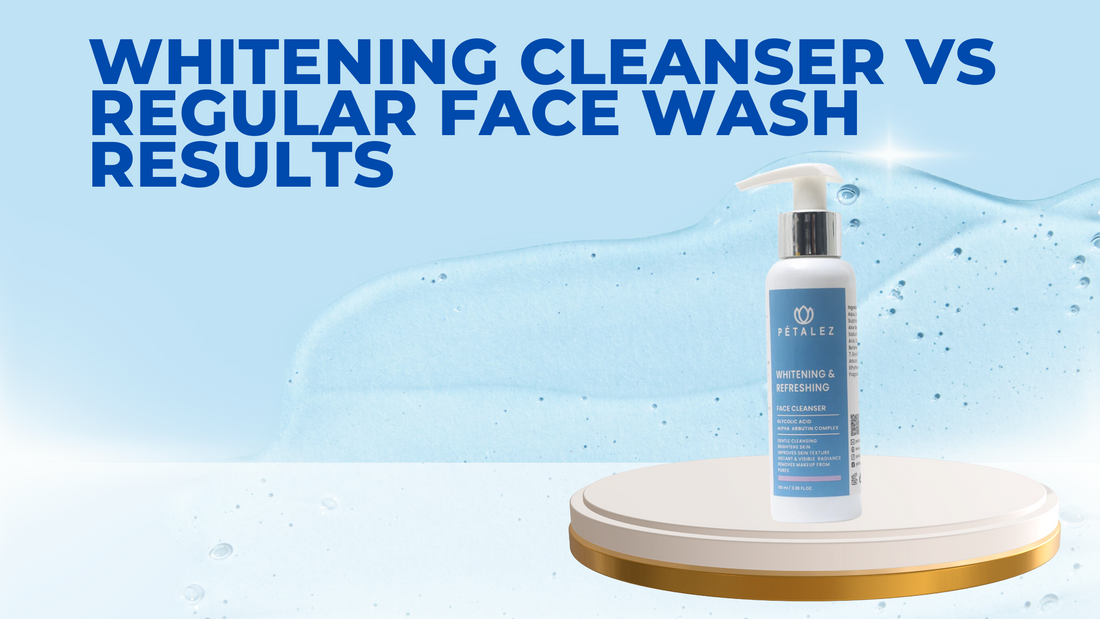
Whitening cleanser vs regular face wash results
Share
Facial cleansing is the foundation of any good skincare routine. It’s the first step to healthy-looking skin, removing dirt, oil, and makeup that can clog pores. Recently, whitening cleansers have taken the spotlight, sparking curiosity. Many wonder if they deliver better results than regular face washes. This article compares their effects, helping you decide which might work best for your skin.
 These ingredients mainly focus on cleansing rather than altering skin tone. They help maintain a fresh look but don't necessarily treat skin discoloration.
These ingredients mainly focus on cleansing rather than altering skin tone. They help maintain a fresh look but don't necessarily treat skin discoloration.
Composition and Active Ingredients
Regular Face Wash Components
Most regular face washes contain:
- Surfactants: Clean dirt and oil.
- Glycerin: Keep skin soft.
- Mild cleansers: Prevent irritation.
Whitening Cleanser Components
Ingredients often found include:
- Vitamin C: Brightens skin and fights dullness.
- Niacinamide: Improves skin barrier and reduces spots.
- Licorice extract: Lightens dark patches.
- Arbutin: Known for reducing pigmentation.
These powerful ingredients work together to fight uneven skin tone and promote radiance. But they can irritate sensitive skin if not used carefully.
Results: Expectations and Effectiveness
Skin Brightening and Even Tone
Whitening cleansers are designed to give you a more luminous look. Users notice a brighter glow after consistent use for a few weeks. Clinical studies report visible results in reducing dullness and dark spots within four to six weeks.
Deep Cleansing and Oil Control
Regular face washes excel at removing surface impurities quickly. They leave skin feeling fresh and oil-free. But they don’t usually target deeper pigmentation or uneven tone like whitening cleansers can.
Hyperpigmentation and Dullness Reduction
While whitening cleansers can fade dark spots and hyperpigmentation, they are not magic cures. Consistency is key, and results vary based on the severity of skin issues. They work best for mild concerns and need additional targeted treatments for stubborn spots.
Long-term Skin Health
Daily cleansing helps maintain overall skin health. Regular face washes prevent breakouts and keep pores clear. Whitening cleansers can enhance skin brightness over time, but shouldn’t replace basic cleansing routines. Combining both smartly is the best approach.
User Experience and Suitability
Skin Type Compatibility
- Regular face washes are suitable for all skin types, especially oily or acne-prone skin.
- Whitening cleansers tend to suit normal to dry skin and those with pigmentation concerns.
Potential Side Effects
- Whitening products can cause dryness, redness, or irritation if ingredients are too harsh or if used improperly.
- Regular cleansers may dry out sensitive skin if they contain strong surfactants.
Application Tips for Best Results
- Use whitening cleansers twice daily, followed by moisturizers.
- For regular face wash, choose a product matching your skin type.
- Pair with sunscreen and hydrating serums for better, longer-lasting results.
Expert Insights and Recommendations
Dermatologists agree that both types of cleansers have their place. Regular cleansers keep your skin healthy and prevent problems. Whitening cleansers can improve brightness but should be used with care. Avoid overusing products containing strong active ingredients as they can damage skin barriers. Always patch-test new products and seek professional advice if unsure.
Conclusion
Choosing between a whitening cleanser and a regular face wash depends on your skin goals. If you want to maintain a fresh, clean face, a regular wash is enough. But if dullness and uneven tone bother you, a whitening cleanser might be worth trying. Remember, consistent skincare, sun protection, and proper hydration make the biggest difference. Pick the right product based on your skin type and needs, and watch your skin improve over time.
Frequently Asked Questions (FAQs)
1. Can I use a whitening cleanser every day?
Yes, most whitening cleansers are formulated for daily use, but it's important to check the ingredient strength. If it contains active ingredients like niacinamide or vitamin C, start once a day to assess tolerance.
2. Will a whitening cleanser lighten my natural skin color?
No, whitening cleansers are designed to brighten dull skin and improve skin tone, not bleach or change your natural complexion.
3. What’s better for oily skin – regular face wash or whitening cleanser?
If your primary concern is excess oil and breakouts, a regular face wash with deep cleansing properties is ideal.
4. How long does it take to see results from a whitening cleanser?
Most users begin to see visible results like improved radiance and reduced dark spots within 4 to 6 weeks of consistent use. For best results, combine with SPF, proper hydration, and a well-rounded skincare routine.
5. Can I use both a regular face wash and a whitening cleanser in my routine?
Yes! This is often recommended. Use a regular cleanser in the morning for oil control and freshness, and a whitening cleanser at night to target hyperpigmentation and dullness.
6. Do whitening cleansers work on acne scars?
Whitening cleansers with ingredients like niacinamide and licorice extract can help lighten post-acne marks, but they won’t treat active acne.
7. Are there any side effects of using whitening cleansers?
Possible side effects include dryness, irritation, or redness, especially if overused or if your skin is sensitive.
8. Are whitening cleansers safe for all skin types?
Generally, yes if you choose the right formulation. Look for products labeled suitable for sensitive skin or "gentle formula." Avoid overly harsh ingredients or high concentrations of actives if your skin is reactive.

